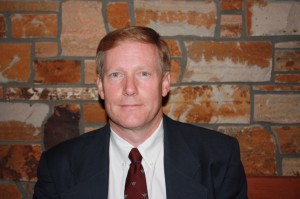
By Taylor Rexrode
Staff Writer
World renowned chemist Dr. John L. Wood will join the Baylor faculty this fall as the new Robert A. Welch Distinguished Professor of Chemistry.
Wood has performed groundbreaking research that has been used to help better understand and treat cancer and other diseases. He specializes in the synthesis of small molecules used in pharmaceutical agents.
Dr. Patrick Farmer, chair of the chemistry and biochemistry department, said Baylor has tried to get Wood to bring his laboratory to Baylor for years.
“He came and visited a long time ago,” Farmer said. “And we have had him back about three times on different visits as a Welch chair candidate. He has a great career and is really well known. In his own particular field, he is a star.”
Wood realized he had a passion for chemistry while he was an undergrad at the University of Colorado at Boulder.
“Chemistry was one thing I was considering,” Wood said. “I was assigned an adviser in the chemistry department who recommended research. I was paying my way through college and being a lab assistant helped pay my way. I found that I really enjoyed it.”
Wood graduated summa cum laude in 1985 from the University of Colorado at Boulder with a bachelor’s degree in chemistry. He then continued his studies at the University of Pennsylvania where he received his doctorate in organic chemistry in 1991. He became an American Cancer Society Postdoctoral Fellow at Harvard in 1993.
However, Wood found that performing the research was not his favorite part of working in a lab.
He enjoyed being able to teach other scientists his methods while allowing them to find their own ways of solving scientific, medical problems.
Wood went on to teach as a tenured professor of chemistry at Yale University from 1998 to 2006 and then moved to his home state of Colorado to teach as the A.I. Meyer Professor of Chemistry at Colorado State University.
In his plans to come to Baylor, Wood said he wants to teach chemistry courses along with running his laboratory. According to Farmer, he may begin teaching as early as spring 2014.
“The part of my job I like the most is watching people learn,” Wood said. “Welch professors were traditionally research positions, but that is counter to my position. I think if you improve undergraduate research and interaction, you will improve the university as a whole. I like interacting with undergraduate students and watching them get introduced to the excitement.”
Dr. Lee Nordt, dean of the College of Arts and Sciences, linked Wood and the Welch chair position to Baylor’s Pro Futuris plan.
“If you look at Pro Futuris as a guide,” Nordt said, “there is a lot of verbage about the need to build in the health sciences. One-third of our incoming freshman class declares a health science major, so we are going to make a concerted effort toward building health sciences for the next 10 years.”
Wood’s position will not only improve the lives of students and faculty within the science building but will help bring national attention to Baylor as a research institution.
“The Welch chair position was originally meant to bring in a researcher,” Farmer said. “A researcher who was going to raise the quality and stature of the university and provide a research core that the department could build around. John really fits the bill.”
The Welch Foundation, founded in 1952, has helped strengthen chemistry research in Texas through research grants, departmental programs, endowed chairs and other special projects.
With funds from the foundation, Baylor and other Texas universities are able to bring in top chemists from around the world to their research facilities.



